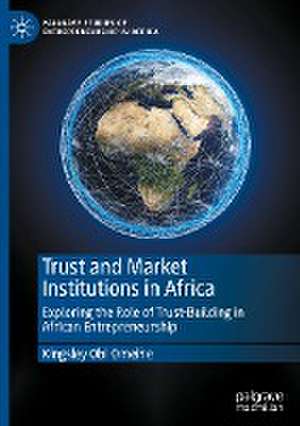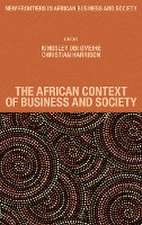Trust and Market Institutions in Africa: Exploring the Role of Trust-Building in African Entrepreneurship: Palgrave Studies of Entrepreneurship in Africa
Autor Kingsley Obi Omeiheen Limba Engleză Hardback – 10 apr 2023
Based on an investigation of entrepreneurs operating across West Africa, the book explores how indigenous arrangements are sufficient in enforcing credible commitments to agreements. In the process, the author argues that trust is essential in stimulating entrepreneurial incentives in Africa. The book brings the real-world situation of local actors in live situations that almost every African entrepreneur can identify with. In a bold new step, the book attempts to show how African entrepreneurs have been able to respond to the specific socio-economic challenges of their environment and raises questions about the role of alternative indigenous institutions. For those interested in African studies, the book’s chapters and readings capture fresh insights and renewed enthusiasm for African entrepreneurship.
Preț: 943.25 lei
Preț vechi: 1150.31 lei
-18% Nou
Puncte Express: 1415
Preț estimativ în valută:
180.58€ • 188.41$ • 151.37£
180.58€ • 188.41$ • 151.37£
Carte tipărită la comandă
Livrare economică 13-27 martie
Preluare comenzi: 021 569.72.76
Specificații
ISBN-13: 9783031062155
ISBN-10: 3031062159
Pagini: 165
Ilustrații: XXIII, 165 p. 6 illus.
Dimensiuni: 148 x 210 mm
Greutate: 0.38 kg
Ediția:2023
Editura: Springer International Publishing
Colecția Palgrave Macmillan
Seria Palgrave Studies of Entrepreneurship in Africa
Locul publicării:Cham, Switzerland
ISBN-10: 3031062159
Pagini: 165
Ilustrații: XXIII, 165 p. 6 illus.
Dimensiuni: 148 x 210 mm
Greutate: 0.38 kg
Ediția:2023
Editura: Springer International Publishing
Colecția Palgrave Macmillan
Seria Palgrave Studies of Entrepreneurship in Africa
Locul publicării:Cham, Switzerland
Cuprins
Chapter 1: Introduction.- Chapter 2: Paws for Thought: Reflections on the First Four Years of Lakeside Care Farm.- Chapter 3: Fear, fiction and facts: Animals in outdoor learning environments.- Chapter 4: Learning About the World to Save the World: How learning from animals may provide a means of promoting environmental awareness.- Chapter 5: Animals as catalysts for learning, personal growth and enlightenment.
Notă biografică
Kingsley Omeihe is an Associate Professor of Marketing and Small Business at the University of the West of Scotland. He is the President of the Academy for African Studies and Chair of African Studies at the British Academy of Management (BAM). He also serves as Chair of the Entrepreneurship in Minority Groups at the Institute for Small Business and Entrepreneurship (ISBE) and Senior Economic Advisor at the Marcel House. His research interest in economic sociology examines the role of networks and norms in the emergence of economic institutions. This includes examining the reflexive basis of reputation in multiplex networks, and identifying the sources of trust in low-trust societies and their sources of cooperation.
Textul de pe ultima copertă
This book places special focus on the importance of trust building, particularly in economies where formal legal arrangements are lacking. Taking the case of Africa, the author provides a framework of how indigenous institutions specify and define the rules, thereby allowing entrepreneurship to thrive. In particular, the book delves into the distinct evidence of institutional rivalry within Africa where competing institutions co-exist, leading to the emergence of dominant hybrid institutional forms. By placing enforcements at the heart of the issue, the author makes a convincing case for trust in a range of indigenous institutional arrangements.
Based on an investigation of entrepreneurs operating across West Africa, the book explores how indigenous arrangements are sufficient in enforcing credible commitments to agreements. In the process, the author argues that trust is essential in stimulating entrepreneurial incentives in Africa. The book brings the real-world situation of local actors in live situations that almost every African entrepreneur can identify with. In a bold new step, the book attempts to show how African entrepreneurs have been able to respond to the specific socio-economic challenges of their environment and raises questions about the role of alternative indigenous institutions. For those interested in African studies, the book’s chapters and readings capture fresh insights and renewed enthusiasm for African entrepreneurship. Kingsley Omeihe is Head of Business Management at the University of Aberdeen. He is the President of the Academy for African Studies and Chair of African Studies at the British Academy of Management (BAM). He also serves as Chair of the Entrepreneurship in Minority Groups at the Institute for Small Business and Entrepreneurship (ISBE) and Head of macroeconomics at the Marcel House. His research interest in economic sociology examines the role of networks and norms in the emergence of economic institutions.This includes examining the reflexive basis of reputation in multiplex networks, identifying the sources of trust in low-trust societies and their sources of cooperation.
Based on an investigation of entrepreneurs operating across West Africa, the book explores how indigenous arrangements are sufficient in enforcing credible commitments to agreements. In the process, the author argues that trust is essential in stimulating entrepreneurial incentives in Africa. The book brings the real-world situation of local actors in live situations that almost every African entrepreneur can identify with. In a bold new step, the book attempts to show how African entrepreneurs have been able to respond to the specific socio-economic challenges of their environment and raises questions about the role of alternative indigenous institutions. For those interested in African studies, the book’s chapters and readings capture fresh insights and renewed enthusiasm for African entrepreneurship. Kingsley Omeihe is Head of Business Management at the University of Aberdeen. He is the President of the Academy for African Studies and Chair of African Studies at the British Academy of Management (BAM). He also serves as Chair of the Entrepreneurship in Minority Groups at the Institute for Small Business and Entrepreneurship (ISBE) and Head of macroeconomics at the Marcel House. His research interest in economic sociology examines the role of networks and norms in the emergence of economic institutions.This includes examining the reflexive basis of reputation in multiplex networks, identifying the sources of trust in low-trust societies and their sources of cooperation.
Caracteristici
Provides new theoretical insights on African entrepreneurship and institutions Focuses on multiple case studies and provides insights on alternative indigenous arrangements Advances our understanding of how trust and network relationships operate within the West African context





































